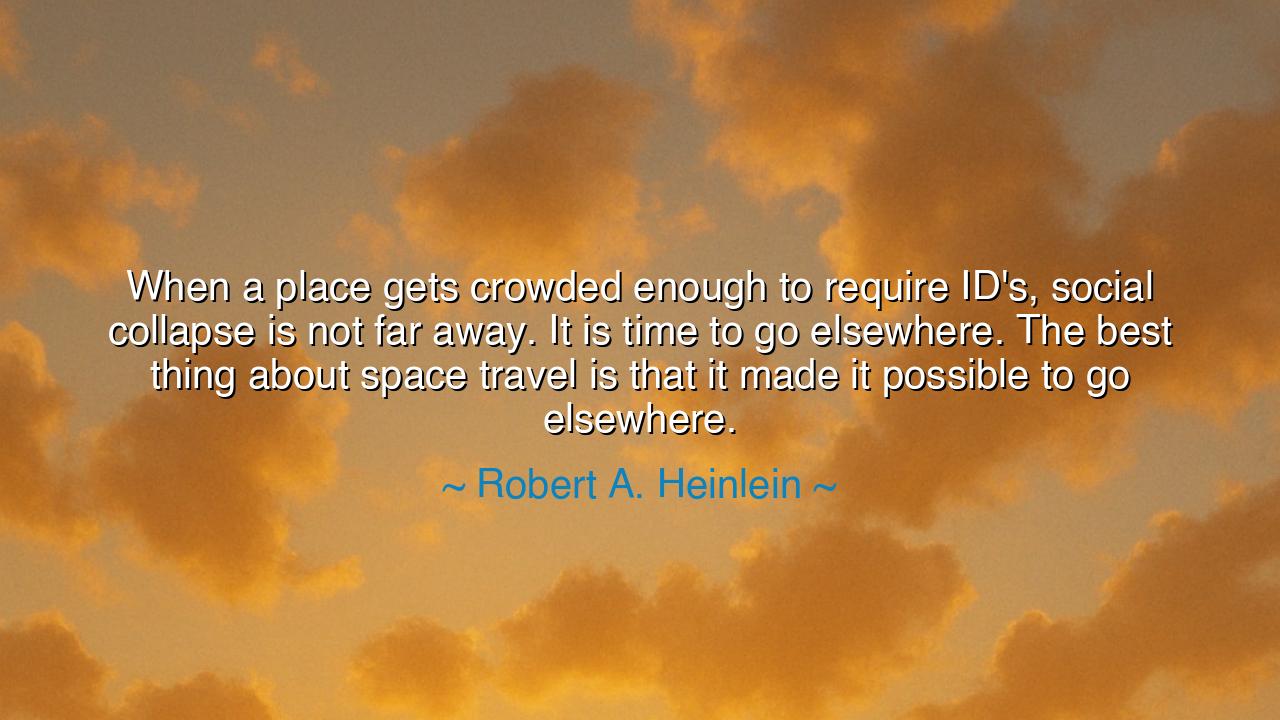
When a place gets crowded enough to require ID's, social collapse
When a place gets crowded enough to require ID's, social collapse is not far away. It is time to go elsewhere. The best thing about space travel is that it made it possible to go elsewhere.






In the heart of every civilization, there lies a truth that resonates deeply within the human spirit—the yearning for freedom, expansion, and the eternal pursuit of a place where one can breathe without the constraints of crowded spaces and oppressive systems. Robert A. Heinlein, a visionary of his time, understood this deeply, and in his words, "When a place gets crowded enough to require ID's, social collapse is not far away. It is time to go elsewhere. The best thing about space travel is that it made it possible to go elsewhere," he captured a profound truth about the nature of human society. As a place becomes overrun, when the freedom of movement and identity becomes restricted, the spirit of exploration rises, calling humanity to the vast unknown, to the expanse of the stars, to places where the human soul can expand once more.
In the ancient world, exploration was not only about the conquest of land or the discovery of new realms. It was about escape—the drive to find new frontiers when the known world became too confining. Consider the ancient Greeks, whose great philosophers and thinkers constantly sought to understand the world, yet they also believed in the possibility of transcending their earthly limitations. The myth of Odysseus is one such story, where the hero embarks on a long, treacherous journey not just to return home, but to escape the confines of the known world, to find a place of freedom and peace. Heinlein’s words echo this ancient drive for newness, for space, and for liberation from the chaos of overcrowdedness—a drive that speaks to the very core of the human condition.
Just as the ancient world saw exploration as a means of escape and growth, so too did later generations. Christopher Columbus sought the New World not just for wealth, but as a way to escape the pressures and restrictions of the Old World. His discovery of the Americas was not merely a geographical achievement but an act of breaking free—an attempt to find a place where one could live, think, and create without the crushing weight of societal structures. In much the same way, Heinlein’s vision of space travel offers the ultimate form of escape, a journey to realms so distant and free from human overreach that they promise the possibility of starting anew. Space travel, then, is not just a tool for exploration but a means of transcending the limits placed on the human spirit by an overcrowded society.
In the modern era, we see Heinlein’s vision coming to life through the advancements in space travel. The idea that we could one day leave the confines of Earth and seek a new home among the stars is both a literal and metaphorical journey. The desire for space, both physical and existential, has led to the exploration of space by NASA and private companies like SpaceX. The promise of finding new worlds to explore, new places to live, and new frontiers to conquer has inspired generations of engineers, scientists, and dreamers. But the message behind Heinlein’s quote is deeper than the technological achievement itself—it is about the eternal human desire to break free from the constraints of overcrowded, oppressive systems and to find new possibilities for growth and freedom.
History is replete with examples of societies that, as they grew and became more populated, faced the looming threat of collapse. The Roman Empire, in its decline, saw a vast influx of people, both from conquered lands and within its borders, leading to a breakdown in social structure, governance, and identity. The resulting chaos eventually led to the fall of the empire. Heinlein’s words are a reflection on this very human cycle: when society becomes too crowded, too burdened with its own complexities, the spirit of exploration rises, seeking out new lands and new beginnings. Space travel, in this sense, becomes not just a scientific endeavor but a necessity—a means of preserving the human spirit from the confines of its own creations.
The lesson here is one that speaks not only to the world of space exploration, but to the world we live in now. As the pressures of modern life, the overcrowdedness of our cities, and the limits of our resources weigh on us, we too feel the need to find space to breathe. Whether that space is physical, mental, or spiritual, it is clear that the human spirit is always yearning to grow, to expand, and to find new frontiers. Heinlein’s vision reminds us that the desire to go “elsewhere” is not just about leaving the known world, but about finding freedom in new places, where we can be our truest selves, free from the constraints of a society that has outgrown its usefulness.
As we continue to face the challenges of an overcrowded world, let us take Heinlein’s words to heart. Let us remember that the human spirit is not meant to be confined by walls, by boundaries, or by societal pressures. We are meant to reach beyond, to seek out new places, new ways of being, and new worlds where we can expand and thrive. Whether through space exploration, personal growth, or seeking new opportunities in life, let us embrace the journey, knowing that the desire to go elsewhere is not just a call to explore the stars, but to explore the full potential of who we can become. In that journey, we find our true purpose—not just as individuals, but as a collective that will one day chart a course for a new future.






AAdministratorAdministrator
Welcome, honored guests. Please leave a comment, we will respond soon